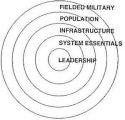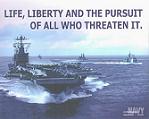pvebber,
It is always difficult to argue with a true believer. However, the quote below explains why.
The quote means that Warden and his strategy are right and that the politicians are wrong. This statement is smart. Two things can happen: ONE: airpower can force Qadhafi to his knees. In that case, Warden is right because his strategy worked. TWO: airpower can fail to force Qadhafi to his knees. In that case, Warden is right but the politicians failed to apply his strategy in the right way.
The trick to counter a true believer's circular argument is to find inconsistencies in Warden's text itself. That inconsistency is stated in Warden's original article:
In other words, a strategist cannot blame a politician for a failure in strategy to deliver the expected results. It is the strategist's job to come up with a strategy within the limitations of politics. It is not the politician's job to make realities fit the strategy.Originally Posted by Warden
Marc








 ) and why he is a "true beleiver" in the controversial ideas?
) and why he is a "true beleiver" in the controversial ideas?

 ) the Warden theory presupposes a known destination, a map, and the existance of roads that take you from where you are to where you want to be. That is indeed one subset of military problem. But it is not the totality of military (or policy) problems in general. The paper on "mudlding through" (above) explains this quite well. Sometimes there is only a vast desert and the knowledge that if you stay where you are, you will likely die. Going ANYWHERE is preferable to going nowhere.
) the Warden theory presupposes a known destination, a map, and the existance of roads that take you from where you are to where you want to be. That is indeed one subset of military problem. But it is not the totality of military (or policy) problems in general. The paper on "mudlding through" (above) explains this quite well. Sometimes there is only a vast desert and the knowledge that if you stay where you are, you will likely die. Going ANYWHERE is preferable to going nowhere.  so unitl later it can all be summed up by Detective Joe Friday-from Dragnet fame.
so unitl later it can all be summed up by Detective Joe Friday-from Dragnet fame.

Bookmarks